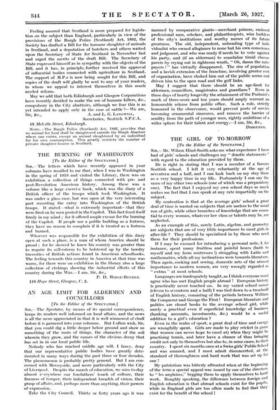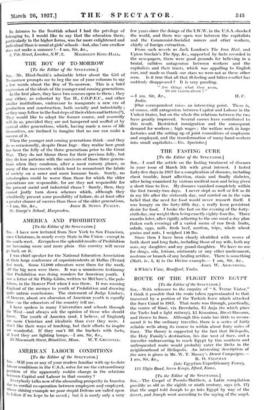THE GIRL OF TO-MORROW
[To the Editor of the SPECTATOR.] SIR,—Mr. Wilson Hind-Smith asks me what experience I have had of girls' schools and challenges my " drastic statements" with regard to the education provided by them.
He is right in stating that I was a member of a famous
Scottish school. I left it very reluctantly at the age of seventeen and a half, and I can look back on my stay there as a very happy time in my life. Fortunately I can say the same of my other two schools (one of which was a preparatory one). The fact that I enjoyed my own school days so much
makes me feel that I can speak at any rate impartially on the subject.
My contention is that at the average girls' school a great deal of time is wasted on subjects that are useless to the usual run of girls, while other branches of knowledge that are essen- tial to every woman, whatever her class or talents may be, arc neglected.
As an example of this, surely Latin, algebra, and geometry are subjects that are of very little importance to most girls in after-life ? They should be specialized in by those who need them for their professions.
If I may be excused for introducing a personal note, I, for instance, spent many fruitless and painful hours (both to myself and my form mistresses !) struggling with Latin and mathematics, while all my inclinations were towards literature. Then again, cooking and sewing, domestic arts of the utmost importance to modern women, are very wrongly regarded as " extras " at most schools.
Languages are inadequately taught, as I think everyone must agree who has met English people abroad ! European history is practically never touched on. In my varied school career (eleven to seventeen and a half) I was tied down to a treadmill of English history, consisting of the periods between William the Conqueror and George the First ! European literature and politics are closed books to the average school girl, while surely a practical even if superficial knowledge of business (banking accounts, investments, &c.) would be a useful addition to a girl's education ?
Even in the realm of sport, a great deal of time and energy are wrongfully spent. Girls are made to play cricket (a game that women can never hope to excel at) when they might be practising tennis, and later have a chance of thus bringing credit not only to themselves but also to, in some cases, to their country. I spent six months once at a Swiss girls' Public School and was amazed, and I must admit disconcerted, at the standard of thoroughness and hard work that was set up for one !
My patriotism was bitterly affronted when at the beginning of the term a special appeal was issued by one of the directors to " les anglaises," begging them to apply themselves to hard work. Roughly speaking, the difference between foreign and English education is that abroad schools exist for the pupils, while in England girls are too often made to feel that they exist for the benefit of the school I In fairness to the Scottish school I had the privilege of belonging to, I would like to say that the education there, particularly in the higher forms, was far more enlightened and individual than is usual at girls' schools—but, alas ! one swallow does not make a summer !—I am, Sir, &c.,























































 Previous page
Previous page